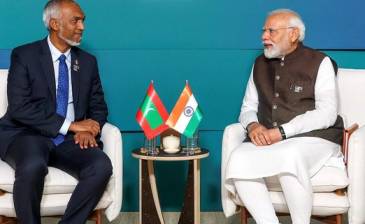Express View on India-Maldives row : Dangers of hypernationalism on both sides
Few would have thought that Prime Minister Narendra Modi’s visit to Lakshadweep — only the second such visit by an Indian PM to the long-neglected islands — would kick up a tsunami of controversy engulfing relations between India and Maldives, already under considerable strain . While both sides have reasons to manage the fallout from the entirely avoidable episode , it highlights the dangers of hypernationalism for two South Asian neighbours with much at stake in wide-ranging cooperation. It is also a reminder to the new rulers of Maldives that small nations must exercise prudence in dealing with their neighbours. Needless provocations can trigger consequences that could, in the end, hurt the smaller neighbour a lot more. While Delhi’s official reaction has been tough and correct in communicating its outrage through diplomatic channels, India’s thin-skinned social media warriors have made a bad situation worse. The managers of these warriors must know that you can’t bully your neighbours into submission ; they must also recognise that hypernationalists do more harm to India than to the target of the day. Above all, they constrain the freedom of action for Indian diplomacy and alienate many of Delhi’s friends and partners in the neighbourhood.
There is no question that the blame for this controversy lies at the door of Maldives — it began when three brash deputy ministers used offensive language against PM Modi’s posts on a social media platform about his trip to Lakshadweep last week, celebrating the natural beauty of the islands and its potential attractions for the Indian tourist. As two former presidents — Ibrahim Solih and Mohamed Nasheed — strongly condemned the ministers’ remarks , the incumbent president, Mohamed Muizzu, moved quickly to suspend the three deputy ministers. But make no mistake, the sentiment in the tweets represents real hostility against India. Having come to power on an anti-India platform in the elections last year, the new government of Maldives has wasted no time in asking Indian military personnel to leave the country and ending the agreement with the Indian navy for a hydrographic survey of its waters. Muizzu had ostentatiously chosen to travel to Turkey on his first official visit late last year, is now on a state visit to China and appears confident that he can diminish India’s salience in the island republic.
But if the episode underlines a bristling ultranationalism in Maldives, the social media response in India has also been over the top. The trending hashtag “boycott Maldives” is self-defeating — China is well-positioned to step in . There are various other sources of tourist inflow into Maldives, including Europe and Russia. The social media claim that Lakshadweep is an alternative to Maldives is delusional ; India is far from developing the necessary infrastructure in Lakshadweep and connectivity to the islands. PM Modi’s visit to the islands was an important first step that requires sustained follow-up action . Boycotting Maldives in any form will only reduce India’s leverage in the islands. Delhi should instead double down on a firm but patient engagement with Maldives that will rally friendly forces in the country and remind the ruling party of the dangers of pushing too hard against India.
